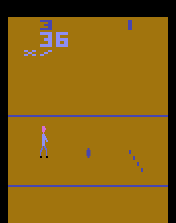Bowling (video game)
| Bowling | |
|---|---|
 | |
| Developer(s) | Atari |
| Publisher(s) | Atari |
| Designer(s) | Larry Kaplan |
| Platform(s) | Atari 2600 |
| Release |
|
| Genre(s) | Sports |
| Mode(s) | Single-player, multiplayer |
Bowling is a 1979 video game for the Atari 2600 designed by Atari programmer Larry Kaplan; published by Atari. The game is based on the game of bowling, playable by one player or two players alternating.
Gameplay
In all six variations, games last for 10 frames, or turns. At the start of each frame, the current player is given two chances to roll a bowling ball down an alley in an attempt to knock down as many of the ten bowling pins as possible. The bowler (on the left side of the screen) may move up and down his end of the alley to aim before releasing the ball. In four of the game's six variations, the ball can be steered before it hits the pins. Knocking down every pin on the first shot is a strike, while knocking every pin down in both shots is a spare. The player's score is determined by the number of pins knocked down in all 10 frames, as well as the number of strikes and spares acquired.
Variations
Odd-numbered variants are one player games, while two players alternate on frames in even-numbered games.
- Games 1/2: The bowling ball can be moved in one direction after being thrown.
- Games 3/4: The bowling ball can be moved up and down after being thrown.
- Games 5/6: The ball moves straight and cannot be moved.
Physics
- Strikes are easily obtained in this game by positioning the player at the bottom of the screen and then listening to the number of "rolls" of the ball when it is tossed. On the fourth roll if the player pushes the joystick in the relative north or upward direction more-often-than-not the roll results in a strike. Using this method it is not difficult to bowl games in excess of 250. Bowling a perfect game is very possible as well. This is due to a very basic physics model.
Reception
Bowling was reviewed by Video magazine in its "Arcade Alley" column where it was praised as "an enjoyable version of a sport that is perfectly suited to the video arcade format". The reviewers singled out the graphics (including the automatic frame-by-frame scoring and "deft" character animation) as "one of the game's best points".[1]:18, 76
References
- ↑ Kunkel, Bill; Laney, Frank (April 1980). "Arcade Alley: Faster Than A Bullet - Atari's Super Game". Video. Reese Communications: 18, 76, and 77. ISSN 0147-8907.